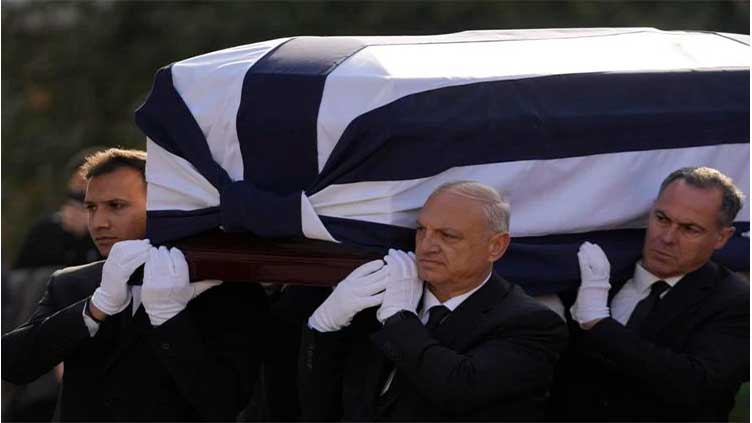Thousands turn out to bid farewell to Greece's former king

World
Thousands turn out to bid farewell to Greece's former king
ATHENS, Greece (Web desk) — With occasional renditions of the Greek national anthem, thousands of people began lining up long before dawn Monday outside Athens’ cathedral to pay their final respects to Greece’s former and last king, Constantine, who died last week at the age of 82.
Royalty from across Europe, including the Spanish and Danish royal families who were closely related to Constantine, was attending the funeral, while hundreds of police were deployed in the Greek capital.
Constantine’s wife, Anne-Marie, is the sister of Denmark’s Queen Margrethe II, who was attending the funeral. His sister Sophia is the wife of Spain’s former King Juan Carlos, and mother of Spain’s current monarch, King Felipe VI. Constantine was one of the godparents of Prince William, heir to the British throne. The British royal family was represented at the funeral by Princess Anne.
Juan Carlos, walking with the aid of a walking stick, arrived at the cathedral with Sophia. It was a rare public appearance for the former king, who has been living in Abu Dhabi since being cut off from the Spanish royal family in 2020 amid financial scandals.
Greece’s monarchy was definitively abolished in a referendum in 1974, and Constantine spent decades in exile before returning to settle in his home country once more in his waning years.
The government announced Constantine would be buried as a private citizen, without honours reserved for former heads of state, next to his parents and ancestors in Tatoi, the former royal estate north of Athens. The estate was ravaged by a wildfire two years ago, and cleanup crews worked feverishly over the weekend before the funeral to clean up the area.
A limited lying in-state was allowed in a chapel next to the capital’s metropolitan cathedral, where the funeral service was held, with members of the public allowed to visit Constantine’s flag-draped coffin from 6 a.m. to 11 a.m.
Braving the pre-dawn darkness and winter chill, thousands of people young and old lined up for hours, some clutching flowers.
“He was a constitutional leader of the country. It was a monarchy then, so we must honour this man who stayed in Greece for so many years and who is Greek,” said Athens resident Georgia Florenti, waiting to pay her respects to the former monarch.
Some mourners expressed disappointment that Constantine was being buried without the honours awarded to former heads of state.
“I feel angry because I consider it petty for funerals to be held at public expense for actors and singers, and for us not to honour a person who, for better or for worse, was king of Greece,” said Irene Zagara.
A controversial figure during a turbulent time in Greek history, Constantine acceded to the throne in 1964 at the age of 23, already an Olympic sailing gold medalist. The young king and his wife enjoyed huge popularity, which quickly eroded because of Constantine’s active involvement in the machinations that brought down the elected government of then Prime Minister George Papandreou.
“There was social adoration for the young king. Any dislikes there were concerned his mother,” said Thanassis Diamantopoulos, professor of political science at Athens’ Panteion University. “He himself was beloved, but unfortunately, through the mindless and thoughtless management of the 1965 crisis, he managed to squander this sympathy very quickly.”
The episode involving the defection from the ruling party of several lawmakers destabilized the constitutional order and led to a military coup in 1967. Constantine eventually clashed with the military rulers and was forced into exile.
When the dictatorship collapsed in July 1974, Constantine was eager to return to Greece but was advised against it by veteran politician Constantine Karamanlis, who returned from exile to head a civilian government.
After his win in a November election, Karamanlis called for a plebiscite on the monarchy. Constantine wasn’t allowed to return to the campaign, but the result was widely accepted: 69.2% voted in favour of a republic.
To his final days, Constantine, while accepting that Greece was now a republic, continued to style himself king of Greece and his children as princes and princesses. For most of his years in exile, he lived in London and was said to be especially close to his second cousin, now King Charles III.
Constantine “should be given credit for something that other deposed monarchs have not done: he never threatened, challenged or undermined the state not headed by a king after he was dethroned,” Diamantopoulos said. “He accepted the 1974 referendum. He did not create a party of monarchy nostalgics. ... Thus with his silence he contributed to cementing the new system of government.”
There have been no significant opinion polls measuring possible support for the former king since the monarchy was abolished, and public discourse in Greece tends to be significantly negative concerning the monarchy.
The prevailing judgment on Constantine “is not exactly unfair, it is one-dimensional,” Diamantopoulos said.
Constantine’s “mistakes were glaring, and they were significant in delegitimizing and undermining smooth political life, especially in how he handled the resignation of (then Prime Minister) George Papandreou,” Diamantopoulos said. “But a discourse that was politically dominant and not altruistic came to treat him negatively for everything, without any reference to the positive contributions he made.”
The size of the crowd waiting patiently for hours in Athens to pay their final respects suggested Constantine as a person was still much loved by a segment of society.
“He is a former high-level official to whom we should certainly show the necessary honours, a person who is serious, who is noble, who is decent,” said lawyer Giannis Katsiavos, who was among the crowd. “We will remember him forever.”

